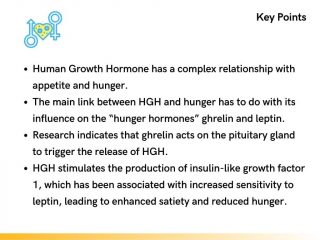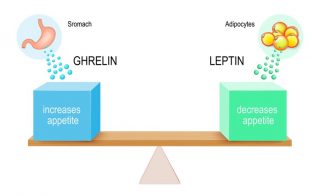Does HGH Make You Hungry: A Comprehensive Analysis

There is a complex relationship between human growth hormone (HGH) and appetite and hunger.
Introduction
There are two main hormones associated with hunger, appetite, and feeling full – ghrelin and leptin. Interestingly enough, both of these hormones are influenced by human growth hormone (HGH). However, growth hormone’s impact on ghrelin and leptin is only one aspect of the complex relationship between HGH and hunger.
On these pages, we will take an in-depth look at the relationship between HGH and appetite and explore the question, “Does HGH make you hungry?”
Understanding the Relationship Between HGH and Hunger
HGH is a peptide hormone produced by the pituitary gland in the brain. Its primary function is to stimulate growth, cell reproduction, and cellular regeneration. HGH plays a crucial role in childhood growth and development, but it continues to have effects on the body throughout life. It influences various metabolic processes, including protein synthesis, lipid metabolism, and carbohydrate metabolism. In this way, HGH also plays a key role in hunger, appetite, and weight management.
Mechanism of HGH Action on Hunger
Hunger is the physiological sensation that drives us to seek and consume food. It is regulated by a complex interplay of hormones, neurotransmitters, and other factors. The two key hormones involved in hunger regulation are ghrelin and leptin.

Of the two, the “hunger hormone” is ghrelin. Ghrelin is the hormone that stimulates appetite.
The satiety hormone, or the one that can make you feel full, is leptin. Leptin is the opposite of ghrelin; it decreases your appetite – or tells your body that you are full, whereas ghrelin increases appetite and tells your body you are hungry. Like ghrelin, leptin impacts body weight in other ways than being an appetite suppressor. Leptin plays a major role in metabolism, energy, and fat storage. Leptin targets the brain and tells it whether the body has enough energy and if calories need to be burned or stored as fat.
Research has found that HGH can affect hunger and appetite regulation through its interactions with ghrelin and leptin. HGH also exerts indirect effects on hunger through its influence on body composition.
Ghrelin is a hormone primarily produced by the stomach. It is known as the “hunger hormone” because it stimulates appetite and promotes food intake. HGH has been found to suppress the secretion of ghrelin. This means that when HGH levels are elevated, such as during periods of growth or HGH supplementation, ghrelin levels tend to decrease.
Leptin is another hormone involved in hunger regulation. It is produced primarily by fat cells and acts on the hypothalamus to suppress appetite and increase energy expenditure. Leptin levels are generally proportional to the amount of fat mass in the body.
HGH indirectly influences leptin sensitivity through its stimulation of insulin-like growth factor 1 (IGF-1) production. IGF-1 is a key mediator of HGH’s growth-promoting effects. Higher levels of IGF-1 have been associated with increased sensitivity to leptin.
HGH promotes the breakdown of stored fat (lipolysis) and inhibits the storage of fat. By reducing fat mass, HGH can impact hunger levels.
Research Studies on the Effects of HGH on Hunger
There have been several research studies that provide evidence and a mechanism of action for the impact that HGH has on hunger; most of these have to do with the relationship between HGH and ghrelin and leptin, the so-called “hunger hormones.”
For example, a 2021 study conducted by the University of São Paulo’s Biomedical Sciences Institute found that ghrelin acts on the pituitary gland to trigger the release of HGH. Both hormones have receptors in the hypothalamus, a region at the base of the brain with several functions, including appetite regulation.
This is one of several studies to indicate that HGH can suppress ghrelin secretion. Lower levels of ghrelin can lead to a decrease in appetite and reduced hunger sensation. Elevated HGH levels, such as during periods of growth or growth hormone therapy, may contribute to decreased ghrelin levels and, subsequently, reduced hunger. This is one reason why HGH can be effective in helping patients with growth hormone deficiency lose weight.
Studies have also found that HGH impacts leptin levels, though less directly than ghrelin. HGH stimulates the production of insulin-like growth factor 1 (IGF-1), which is a key mediator of HGH’s growth-promoting effects. IGF-1, in turn, influences leptin sensitivity. Higher levels of IGF-1 have been associated with increased sensitivity to leptin, leading to enhanced satiety and reduced hunger. This is another way that HGH can reduce hunger and possibly aid in weight loss.
Factors Influencing Hunger While Taking HGH
Several other factors can influence the relationship between HGH and hunger.
Nutritional Status

Caloric intake and nutrient availability play a significant role in HGH secretion. In times of reduced caloric intake, such as during fasting or severe dieting, HGH levels tend to rise. This increase in HGH may contribute to appetite suppression and reduced hunger to conserve energy.
Body Composition
Adipose tissue (fat) produces leptin, and its levels are proportional to fat mass. Individuals with higher levels of body fat typically have elevated leptin levels, which can lead to increased satiety. HGH’s effects on body composition, particularly its potential to reduce fat mass, may indirectly influence hunger levels by altering leptin production.
Exercise

Physical activity and exercise have been shown to influence HGH secretion. Intense exercise, such as resistance training or high-intensity interval training, can stimulate HGH release. Regular exercise is associated with improved appetite regulation and increased satiety, potentially through the modulation of various hunger-related hormones.
Dosage and Administration of HGH
The dosage and duration of HGH treatment can also impact the hunger response. Higher doses or prolonged HGH therapy may have different effects on hunger regulation compared to lower doses or short-term treatment. These factors can vary depending on the specific medical condition being treated and the goals of HGH therapy.
Individual Variations in Hunger Response to HGH
Individual variations in hunger response to human growth hormone (HGH) can arise due to several factors, including genetic differences, metabolic rate, and hormonal regulation. While HGH primarily acts as a growth-promoting hormone, it also influences metabolism and can affect hunger and satiety signals.
Dietary Strategies and Lifestyle Modifications to Control Hunger
Here are some dietary strategies and lifestyle modifications that can help control hunger:
- Eat protein-rich foods and healthy fats.
- Increase fiber intake.
- Stay hydrated.
- Eat smaller, frequent meals.
- Learn about mindful eating.
- Get enough sleep.
- Get regular physical activity.
Consultation with Healthcare Professionals
HGH can suppress hunger. Also, HGH levels can increase in response to fasting. The relationship between HGH and hunger and weight is a complex one. HGH should never be used for weight management, nor should fasting be employed as a weight loss method or as a way to boost HGH without consulting with a healthcare provider. HGH is a controlled substance and is illegal to use without a doctor’s prescription; HGH should not be used for appetite control, weight loss, or any other purpose without medical supervision.
Summary of Key Points
In summary, the relationship between HGH and hunger is intricate. HGH can affect hunger and appetite regulation through its interactions with ghrelin and leptin. It suppresses ghrelin secretion, reducing appetite while also potentially influencing leptin sensitivity. Nutritional status, body composition, and exercise further modulate the relationship between HGH and hunger. Understanding these mechanisms provides insight into the broader physiological processes involved in hunger regulation.

